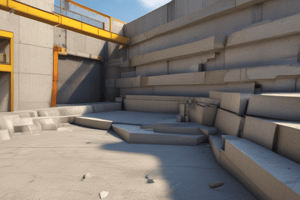Podcast
Questions and Answers
What is the primary advantage of using gap-graded aggregates in concrete?
What is the primary advantage of using gap-graded aggregates in concrete?
- More economical concrete and lower water-cement ratios (correct)
- Increased cement usage
- Improved workability and compactness
- Higher strength and density
What describes the characteristics of open-graded aggregates?
What describes the characteristics of open-graded aggregates?
- Contain a wide range of particle sizes
- Are easily compacted and manipulated
- Have high permeability with relatively large void spaces (correct)
- Provide low workability and high strength
Which type of aggregate grading leads to a more porous concrete structure?
Which type of aggregate grading leads to a more porous concrete structure?
- Open-graded aggregates
- Gap-graded aggregates
- Uniformly graded aggregates (correct)
- Dense and well-graded aggregates
What is the effect of using dense and well-graded aggregates?
What is the effect of using dense and well-graded aggregates?
Which grading curve lacks intermediate sizes and can result in low workability?
Which grading curve lacks intermediate sizes and can result in low workability?
What is the purpose of washed sieve analysis in aggregate testing?
What is the purpose of washed sieve analysis in aggregate testing?
Which type of grading is characterized by a predominance of larger particles without a significant range of sizes?
Which type of grading is characterized by a predominance of larger particles without a significant range of sizes?
What is a potential negative outcome when using gap-graded aggregates?
What is a potential negative outcome when using gap-graded aggregates?
What defines the maximum aggregate size in dry sieve analysis?
What defines the maximum aggregate size in dry sieve analysis?
How is the nominal maximum aggregate size determined?
How is the nominal maximum aggregate size determined?
What is the formula for calculating specific gravity?
What is the formula for calculating specific gravity?
What characterizes bulk density compared to specific gravity?
What characterizes bulk density compared to specific gravity?
Which statement about relative density and specific gravity is accurate?
Which statement about relative density and specific gravity is accurate?
If the dry mass of a sample is 2239.1 g and the mass in saturated surface dry condition is 2268.4 g with a net volume of 835.4 cm³, what is the relative density?
If the dry mass of a sample is 2239.1 g and the mass in saturated surface dry condition is 2268.4 g with a net volume of 835.4 cm³, what is the relative density?
What is the unit for specific gravity?
What is the unit for specific gravity?
Why is specific gravity preferred over relative density in scientific discussions?
Why is specific gravity preferred over relative density in scientific discussions?
Flashcards are hidden until you start studying
Study Notes
Aggregate Properties
- Gradation is the distribution of particle sizes within an aggregate.
- Well-graded aggregates are desirable for concrete because they pack tightly, leading to a strong and dense structure.
- Gap-graded aggregates lack one or more intermediate sizes.
- They are more economical but result in concrete with lower workability, making it difficult to handle and compact.
- Uniformly-graded aggregates only have a few sizes, making them less efficient in packing and leading to more porous concrete.
- Open-graded aggregates lack fine material resulting in high permeability, making them suitable for backfill.
- Relative Density and Absorption
- Specific Gravity is the ratio of a substance's density to the density of a reference material, usually water.
- It is calculated as the weight of the substance divided by the weight of the same volume of water.
- Bulk Density is the mass of a material per unit volume, including the voids between particles.
- It is always less than the specific gravity because of the voids.
- Specific Gravity is the ratio of a substance's density to the density of a reference material, usually water.
- Hardness
- Refers to the aggregate's resistance to abrasion and wear.
- Durability
- Measures the aggregate's ability to withstand weathering, freezing, and thawing.
- Shape and Surface Texture
- Affect the aggregate's ability to bind with cement paste and influence the concrete's workability and strength.
- Deleterious Substances
- Harmful materials like clay, organic matter, and salts that can weaken concrete.
- Crushing Strength
- Indicates the resistance of an aggregate to crushing forces.
- Soundness
- The ability of an aggregate to withstand weathering cycles without significant deterioration.
- Dry Sieve Analysis
- Used to determine the particle size distribution of an aggregate.
- The maximum aggregate size is the smallest sieve size that allows 100% of the aggregate to pass.
- The nominal maximum aggregate size is one sieve size smaller than the maximum aggregate size.
- Washed Sieve Analysis
- Used when determining the amount of fine material (<75 µm) is crucial.
- The sample is washed to remove fines, and the material retained on a 75 µm sieve is added back to the sample.
- This ensures accurate measurement of the total amount passing 75 µm.
- Used when determining the amount of fine material (<75 µm) is crucial.
Studying That Suits You
Use AI to generate personalized quizzes and flashcards to suit your learning preferences.




